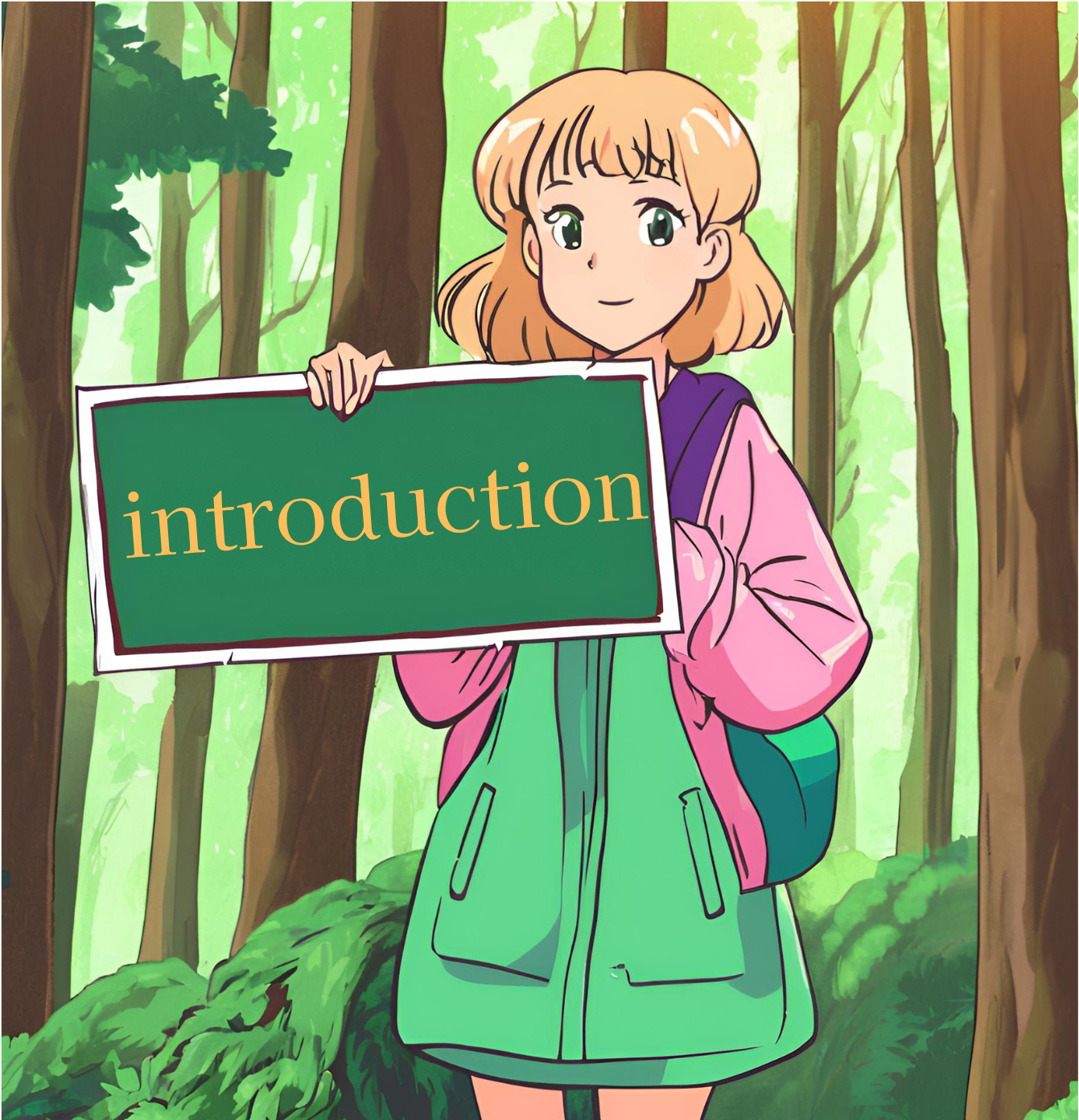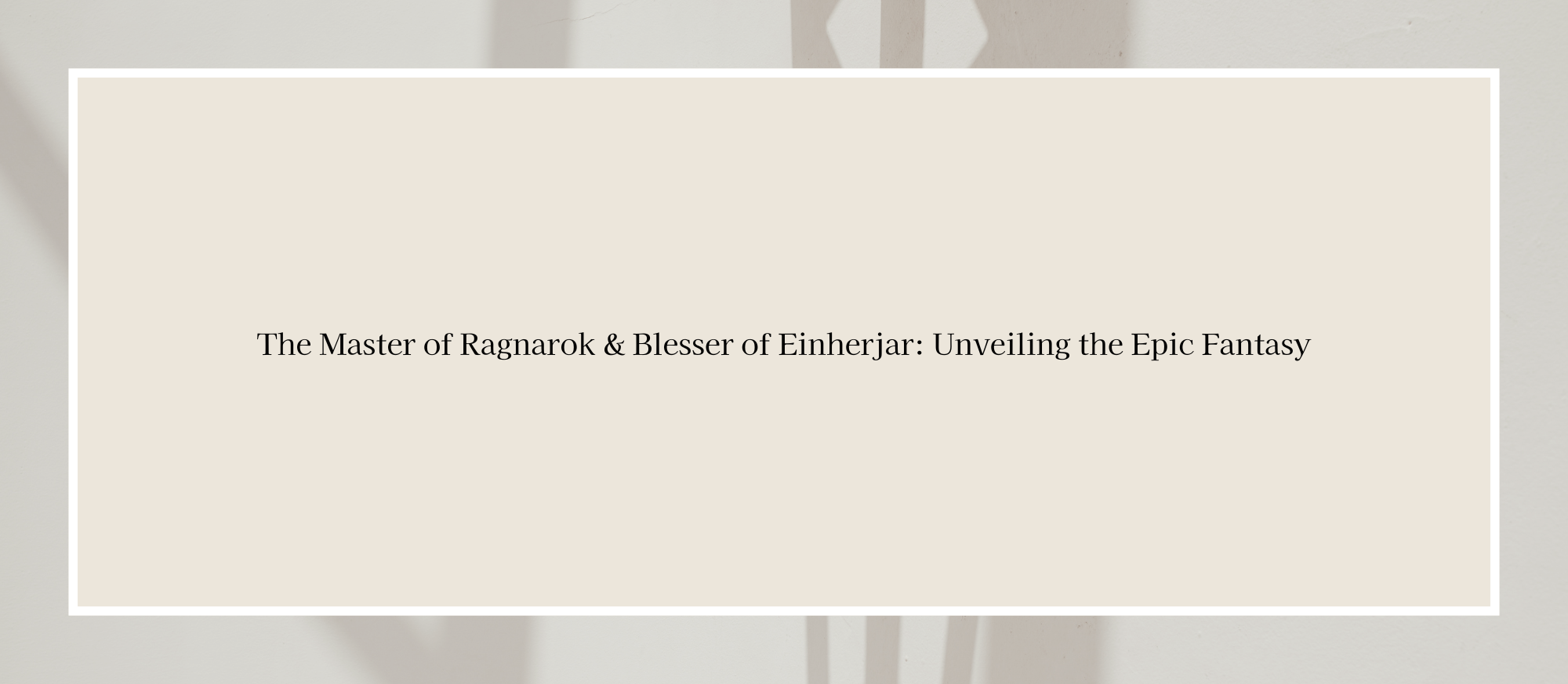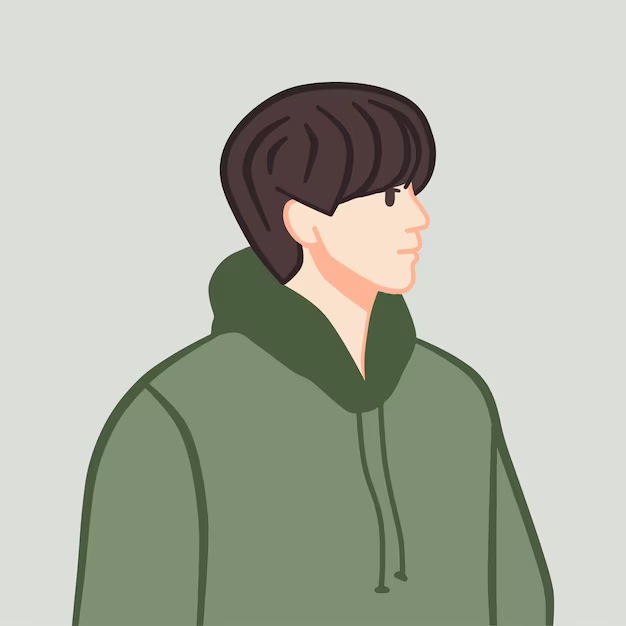Article Body Structure (5 Sections)
1. Introduction to "The Master of Ragnarok & Blesser of Einherjar"
- Overview of the Anime’s Premise and Setting
- A brief introduction to the story, focusing on Yuuto Suoh’s journey to a parallel world.
- Description of the unique setting that combines modern-day elements with ancient Norse mythology.
- Background and Origins
- Explanation of the series' origins as a light novel written by Seiichi Takayama.
- Discussion on its adaptation into an anime and its reception.
2. Meet the Main Characters
- Detailed Descriptions of Key Characters
- Introduction to Yuuto Suoh, the protagonist, and his role as the patriarch of the Wolf Clan.
- Exploration of key characters like Felicia, Sigrun, and other Einherjar warriors.
- Character Relationships and Dynamics
- Examination of the relationships between Yuuto and his Einherjar.
- Analysis of character development and how these relationships drive the narrative.
3. Plot Highlights and Key Episodes
- Summary of Major Plot Points and Story Arcs
- Overview of significant events and major story arcs within the series.
- Key conflicts and battles that shape the storyline.
- Discussion of Key Episodes
- Highlighting pivotal episodes that define the series and their importance.
- Exploration of significant moments and their impact on the overall narrative.
4. Themes and Symbolism in "The Master of Ragnarok & Blesser of Einherjar"
- Discussion of Major Themes
- Exploration of central themes such as leadership, power, and destiny.
- Examination of how these themes are portrayed through character interactions and story arcs.
- Analysis of Symbolism
- Discussion on the use of Norse mythology and its symbolic significance in the series.
- Analysis of how the series blends modern and ancient elements to enhance storytelling.
5. Reception and Cultural Impact
- Summary of the Series’ Reception by Audiences and Critics
- Overview of how the series has been received by fans and critics.
- Highlighting critical reviews and audience feedback.
- Cultural Impact and Contributions to the Genre
- Analysis of the series' influence on the fantasy and isekai genres.
- Discussion on its significance within the anime community.
- Speculation on Future Seasons or Adaptations
- Discussion on potential future developments for the series based on the current storyline and fan expectations.
- Speculation on possible new seasons or spin-offs.
Contents
Introduction to "The Master of Ragnarok & Blesser of Einherjar"

Overview of the Anime’s Premise and Setting
Dive into the captivating world of "The Master of Ragnarok & Blesser of Einherjar," where modern-day elements intertwine with ancient Norse mythology. The story follows Yuuto Suoh, a high school student who, through a mysterious ritual involving a smartphone and a divine mirror, is transported to a parallel world. This new realm, reminiscent of the ancient Norse era, is filled with powerful clans, mythical creatures, and epic battles. Yuuto quickly rises to power as the patriarch of the Wolf Clan, using his knowledge of modern technology and tactics to lead his people to prosperity and strength.
The setting of "The Master of Ragnarok & Blesser of Einherjar" is unique, blending the familiarity of contemporary life with the rich, mystical allure of Norse mythology. The juxtaposition of Yuuto’s high-tech strategies in a world governed by ancient rules creates a compelling narrative that keeps viewers on the edge of their seats. The anime beautifully captures the essence of both eras, offering a fresh perspective on the isekai genre.
Background and Origins
"The Master of Ragnarok & Blesser of Einherjar" originates from a light novel series written by Seiichi Takayama, with illustrations by Yukisan. The light novel was well-received for its innovative storyline and engaging characters, which led to its adaptation into an anime. The anime adaptation, produced by EMT Squared, brings the vivid world of Yuuto and the Wolf Clan to life, enhancing the story with dynamic animation and a gripping soundtrack.
The transition from light novel to anime has garnered mixed reviews. Fans of the original series appreciate the faithful adaptation of key plot points and character arcs, while new viewers are drawn in by the intriguing premise and action-packed sequences. Despite some criticism regarding pacing and character development, the anime has managed to carve out a niche in the competitive world of fantasy and isekai genres.
Reception and Impact
Upon its release, "The Master of Ragnarok & Blesser of Einherjar" sparked interest for its unique blend of modern and ancient elements. While the light novel series had already established a dedicated fanbase, the anime adaptation broadened its reach, attracting a diverse audience. Critics have praised the series for its imaginative setting and the clever use of modern technology in a mythological context. However, some have pointed out areas for improvement, such as deeper character exploration and smoother plot progression.
Overall, "The Master of Ragnarok & Blesser of Einherjar" stands out as a distinctive addition to the isekai genre. Its cultural impact is evident in the discussions it has generated among fans and the interest it has sparked in Norse mythology. The series continues to hold potential for future adaptations, with fans eagerly anticipating new developments in Yuuto’s journey.
By focusing on a seamless blend of engaging narrative, unique setting, and innovative character dynamics, "The Master of Ragnarok & Blesser of Einherjar" offers an immersive experience that resonates with fans of both modern and mythological storytelling. This article aims to provide a comprehensive introduction to the series, highlighting its key elements and the reasons behind its growing popularity.
Meet the Main Characters

Detailed Descriptions of Key Characters
In "The Master of Ragnarok & Blesser of Einherjar," the protagonist Yuuto Suoh plays a central role as the patriarch of the Wolf Clan. Yuuto is a high school student who, after participating in a divine ritual, finds himself in a parallel world that mirrors ancient Norse mythology. Equipped with his smartphone and modern knowledge, Yuuto quickly ascends to leadership, using his strategic skills to guide the Wolf Clan to power and prosperity.
Felicia, one of Yuuto’s closest allies, is a loyal and skilled warrior. As Yuuto's trusted advisor, she supports him in his efforts to lead the clan and navigate the challenges of this new world. Felicia’s unwavering dedication to Yuuto and her combat prowess make her an invaluable asset to the Wolf Clan.
Sigrun is another key character, known for her fierce loyalty and exceptional fighting skills. As one of the Einherjar warriors, Sigrun pledges her strength and service to Yuuto, playing a crucial role in defending the clan and executing his strategic plans. Her relationship with Yuuto is marked by respect and admiration, highlighting her commitment to the clan’s success.
The series also features other notable Einherjar warriors, each with unique abilities and backgrounds. These characters add depth to the story, showcasing the diverse talents and personalities within the Wolf Clan. Their interactions with Yuuto and each other drive much of the series' narrative, creating a rich tapestry of relationships and conflicts.
Character Relationships and Dynamics
The relationships between Yuuto and his Einherjar are central to the narrative of "The Master of Ragnarok & Blesser of Einherjar." Yuuto’s leadership is defined by his ability to inspire loyalty and trust among his followers. His bond with Felicia, characterized by mutual respect and shared goals, exemplifies the strong alliances he forms within the clan.
Sigrun’s relationship with Yuuto highlights the dynamic between a leader and his warrior. Her admiration for Yuuto fuels her determination to protect him and support his vision for the clan. This relationship underscores the theme of loyalty and the sacrifices made for the greater good.
As the story progresses, the development of these characters and their relationships becomes increasingly complex. Yuuto’s modern-day knowledge often clashes with the traditional values of the parallel world, creating tension and opportunities for growth. The Einherjar warriors, each with their own motivations and histories, add layers to the narrative, making their interactions with Yuuto and each other pivotal to the story’s progression.
The evolving dynamics within the Wolf Clan not only drive the plot but also offer insights into themes of leadership, loyalty, and the melding of old and new worlds. Yuuto’s role as the patriarch is continually tested by the challenges he faces and the relationships he fosters, making for a compelling and intricate storyline.
By focusing on the characters and their interwoven relationships, "The Master of Ragnarok & Blesser of Einherjar" presents a multifaceted narrative that engages viewers on multiple levels. The detailed portrayal of each character and their development throughout the series enhances the storytelling, making it a must-watch for fans of fantasy and action-packed adventures.
This exploration of the main characters and their dynamics provides a glimpse into the rich character-driven world of "The Master of Ragnarok & Blesser of Einherjar," inviting viewers to delve deeper into the series and its captivating plot.
Plot Highlights and Key Episodes

Summary of Major Plot Points and Story Arcs
"The Master of Ragnarok & Blesser of Einherjar" follows the story of Yuuto Suoh, a high school student who finds himself transported to a parallel world steeped in ancient Norse mythology. Armed with modern knowledge and his smartphone, Yuuto becomes the patriarch of the Wolf Clan. The series explores his journey as he uses his strategic prowess to lead the clan to power and prosperity.
The storyline is marked by significant events and major story arcs. One of the key arcs involves Yuuto's initial struggles to gain the trust and loyalty of the Wolf Clan members. His innovative use of modern technology and tactics not only secures his position but also brings about a period of unprecedented growth and strength for the clan.
Another critical arc centers around the clan's conflicts with rival factions. These battles are not just physical confrontations but also strategic and political maneuvers that test Yuuto's leadership and resourcefulness. The series delves into the intricacies of warfare, alliances, and betrayals, showcasing the complexities of maintaining power in a world governed by ancient traditions and fierce rivalries.
Throughout the series, Yuuto's relationship with his Einherjar warriors, particularly Felicia and Sigrun, adds depth to the narrative. Their loyalty and dedication are crucial to Yuuto's success, and their interactions highlight themes of friendship, loyalty, and sacrifice.
Discussion of Key Episodes
Several key episodes define the series and are pivotal to its narrative progression. One such episode is the one where Yuuto first demonstrates his innovative strategies using his smartphone. This episode not only establishes his unique approach to leadership but also sets the tone for his interactions with the clan and rival factions.
Another significant episode involves a major battle between the Wolf Clan and a formidable rival. This battle is a turning point in the series, showcasing Yuuto's tactical genius and the strength of the Einherjar warriors. The outcome of this battle has far-reaching implications for the power dynamics in the parallel world.
An episode focusing on the personal growth of Felicia and Sigrun provides insight into their backgrounds and motivations. This episode deepens the viewers' understanding of these key characters and their unwavering support for Yuuto, adding emotional weight to the series.
The series also includes episodes that explore the cultural and mystical aspects of the parallel world. These episodes delve into the ancient Norse mythology that underpins the setting, offering viewers a richer understanding of the world Yuuto inhabits. The blending of modern and ancient elements is a recurring theme, and these episodes highlight the creative world-building that defines the series.
Exploration of Significant Moments
Significant moments throughout the series have a profound impact on the characters and the overall narrative. Yuuto's decision-making during critical junctures, such as forming alliances or engaging in battles, shapes the course of the story. These moments are often accompanied by introspective scenes that reveal Yuuto's thoughts and dilemmas, providing a deeper connection to his character.
The relationships between Yuuto and his Einherjar, particularly their moments of camaraderie and conflict, are pivotal to the series. These interactions not only drive the plot but also explore themes of trust, loyalty, and the responsibilities of leadership. The evolution of these relationships is central to the narrative, highlighting the personal growth of the characters.
The series also features moments of intense action and strategy, where Yuuto's modern knowledge plays a crucial role. These scenes are not only visually captivating but also intellectually engaging, as viewers witness the application of contemporary tactics in an ancient setting. The contrast between old and new is a recurring motif, enriching the storytelling.
Overall, "The Master of Ragnarok & Blesser of Einherjar" offers a compelling blend of action, strategy, and character-driven drama. The series' plot highlights and key episodes provide a rich tapestry of events and relationships that captivate viewers, making it a must-watch for fans of fantasy and strategic warfare.
Reception and Cultural Impact of "The Master of Ragnarok & Blesser of Einherjar"

Summary of the Series’ Reception by Audiences and Critics
"The Master of Ragnarok & Blesser of Einherjar" has garnered a mixed reception from both fans and critics since its release. Audiences have appreciated the unique blend of modern technology with ancient Norse mythology, praising the intriguing premise and the strategic elements introduced by the protagonist, Yuuto Suoh. However, some viewers and critics have pointed out that the series' execution falls short in certain areas, such as character development and pacing. Critical reviews have highlighted these aspects, noting that while the concept is promising, the storytelling sometimes lacks depth and coherence.
Highlighting Critical Reviews and Audience Feedback
Audience feedback reflects a variety of opinions. Many fans enjoy the dynamic between Yuuto and his Einherjar, finding the relationships and battles engaging. The strategic use of modern technology in an ancient setting has also been a standout feature for viewers. On the other hand, some critics have commented on the series' predictable plot twists and the sometimes over-simplified characterization. Despite these criticisms, the series has maintained a dedicated fanbase that appreciates its unique approach to the isekai genre.
Cultural Impact and Contributions to the Genre
"The Master of Ragnarok & Blesser of Einherjar" has made notable contributions to the fantasy and isekai genres. Its integration of Norse mythology adds a rich cultural layer to the story, setting it apart from other isekai series that often draw on different mythological backgrounds. The series' emphasis on leadership and strategy, coupled with its depiction of a protagonist who leverages modern knowledge to navigate an ancient world, offers a fresh take on the isekai trope.
Discussion on Its Significance Within the Anime Community
Within the anime community, "The Master of Ragnarok & Blesser of Einherjar" has sparked discussions on the use of mythology and historical elements in storytelling. It has encouraged fans and creators to explore how modern concepts can be intertwined with traditional narratives to create compelling stories. The series has also contributed to the popularity of light novel adaptations, showcasing the potential for such works to reach wider audiences through anime.
Speculation on Future Seasons or Adaptations
As the current storyline unfolds, there is ongoing speculation about potential future developments for "The Master of Ragnarok & Blesser of Einherjar." Fans eagerly anticipate the possibility of new seasons or spin-offs that could delve deeper into the rich world and characters established in the series. The source material, a light novel series, continues to offer plenty of content that could be adapted, keeping the door open for future anime projects.
Speculation on Possible New Seasons or Spin-offs
Given the series' existing fanbase and the extensive material available in the light novels, there is considerable potential for new seasons or spin-offs. These could explore different aspects of the world, such as the backstories of other clans or further development of secondary characters. Additionally, a spin-off focusing on the aftermath of Yuuto's strategic conquests or exploring new territories within the Norse-inspired world could provide fresh content for fans.
Conclusion
In summary, "The Master of Ragnarok & Blesser of Einherjar" has had a mixed reception but remains a significant player in the fantasy and isekai genres. Its unique blend of modern and ancient elements, coupled with its strategic and mythological themes, has left a lasting impact on the anime community. While there are areas for improvement, the series' concept and potential for future adaptations continue to excite and engage fans.





